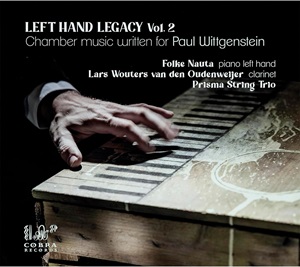
Left Hand Legacy Vol 2
Chamber music written for Paul Wittgenstein
Franz Schmidt (1874-1939)
Quintet in B-flat major for piano left hand, clarinet, violin, viola and cello (1932)
Josef Labor (1842-1924)
Trio No 2 in G minor for clarinet, viola, and piano left hand (1919)
Folke Nauta (piano), Lars Wouters van den Oudenweijer (clarinet), Prisma String Trio
rec. 2023, Westvelt90, Schiedam, The Netherlands
Cobra Records COBRA 0093 [75]
The Wittgenstein family, who derived their impressive wealth from industry and banking, were among the greatest artistic patrons of Vienna at the turn of the twentieth century. It was quite common to see at their home the most eminent artists and musicians of the time. It is not surprising, then, that two of the Wittgenstein brothers, Ludwig and Paul, should achieve prominence in their respective fields. Ludwig became one of the most famous philosophers of the twentieth century.
Before World War One, it looked as if Paul, a pianist, would eventually equal Ludwig, but war intervened: he lost his right arm in the Galician campaign. He might have despaired of a further musical career. Instead, he set out to develop a repertoire of works for piano left hand. He commissioned, inspired or arranged dozens of concerted, chamber and piano solo works. The most famous was Ravel’s Concerto for the Left Hand. Among many other composers who wrote for Wittgenstein, two were notable for the volume of what they produced for him: Franz Schmidt (six works) and Josef Labor (ten works plus one unfinished).
Josef Labor, a well-known figure in Vienna, was a composer, pianist, organist and teacher. His students included Alma Schindler (later Mahler), Arnold Schoenberg and Julius Bittner. Although he was blind, he was a prolific composer. It is not surprising that he wrote many works for Paul Wittgenstein: he was a sort of unofficial composer to the Wittgenstein family.
Here we have Labor’s Trio No 2 for clarinet, cello and piano left hand. The piece is rather conservative for the time, but its themes are distinctive and well-developed. A great sense of amiability animates the whole piece. After a joyful Allegro, the Quasi allegretto second movement is more serious, beautifully written for the three instruments. The clarinet part is very sensitively written all along. The final Allegro, rather Brahmsian, features a plaintive return of the piece’s opening material. This is perhaps not great music, but few could resist the personality behind it.
With Schmidt’s Quintet, we enter very different emotional territory. In 1926, he wrote for Wittgenstein a Quintet in G major for Piano Left Hand and String Quartet. But 1932 was the year of the death of Schmidt’s only child, his daughter Emma. Unlike the 1926 work, a mournful feeling pervades the Quintet which Schmidt amplified with the clarinet instead of the second violin. (There followed directly his Symphony No 4, which he described as a “Requiem for my daughter”.) The opening Andante tranquillo features the music which strains the bounds of its B-flat major tonality as it tries to lift itself from the depths. But the clarinet keeps dragging the other instruments back. The central Lento movement shows the composer’s abilities at their finest. He varies the basic material from spirited and dancelike to slow and lugubrious. To finish, the Allegro ma non troppo starts with ebullient Slavic-style material. This is eventually ousted by hammering chords from all the instruments in the central section of the movement. The composer synthesized these contrasting moods before a short, quiet coda.
The title “Left Hand Legacy Vol. 2” refers to a project which the Dutch pianist Folke Nauta initiated after he lost the use of his right hand due to dystonia. Paul Wittgenstein was his inspiration as he redeveloped his technique for a one-handed career. Nauta decided to explore the many chamber works written for Wittgenstein. He enlisted the help of the Prisma String Trio (Janneke van Proojen, Elisabeth Smalt, and Michiel Weidner), who enthusiastically joined him in the project. Their first disc, released in 2023, featured music by Schmidt and Labor, as well as Hans Gal and Ernest Walker.
Sadly, Nauta died soon after recording the present disc. Aside from memorial considerations, his playing here has both the vigor and lightness required in Labor’s Trio, while his virtuosity and sensitivity in Schmidt’s piece are noteworthy. The Prisma Trio is equally fine. I also was very impressed by the variety of tone clarinettist Lars Wouters van den Oudenweijer brought to his parts in two very different works.
William Kreindler
Buying this recording via a link below generates revenue for MWI and helps us keep free access to the site



















